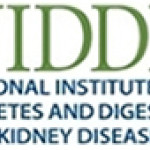- Industrie: Government; Health care
- Number of terms: 17329
- Number of blossaries: 0
- Company Profile:
The National Institute of Diabetes and Digestive and Kidney Diseases (NIDDK) conducts and supports research on many of the most serious diseases affecting public health. The Institute supports much of the clinical research on the diseases of internal medicine and related subspecialty fields, as ...
A penlike device for injecting insulin; contains a needle and a cartridge of insulin.
Industry:Health care
A hormone that helps the body use glucose for energy. The beta cells of the pancreas make insulin. When the body cannot make enough insulin, insulin is taken by injection or other means.
Industry:Health care
A condition in which fragile new blood vessels grow along the retina and in the vitreous humor of the eye.
Industry:Health care
A device that uses high pressure instead of a needle to propel insulin through the skin and into the body.
Industry:Health care
A meal planning system that uses points to rate the caloric content of foods.
Industry:Health care
A dietary sweetener made from sugar but with no calories and no nutritional value.
Industry:Health care
A condition characterized by high blood glucose levels caused by either a lack of insulin or the body's inability to use insulin efficiently. Type 2 diabetes develops most often in middle-aged and older adults but can appear in children, teens, and young people.
Industry:Health care
A grouping of health conditions associated with an increased risk for heart disease and type 2 diabetes. Conditions include hypertension, a large waist, high triglyceride levels, low hdl cholesterol levels, and above-normal blood glucose levels. Metabolic syndrome was previously called syndrome x.
Industry:Health care
A chemical produced when there is a shortage of insulin in the blood and the body breaks down body fat for energy. High levels of ketones can lead to diabetic ketoacidosis and coma. Sometimes referred to as ketone bodies.
Industry:Health care
